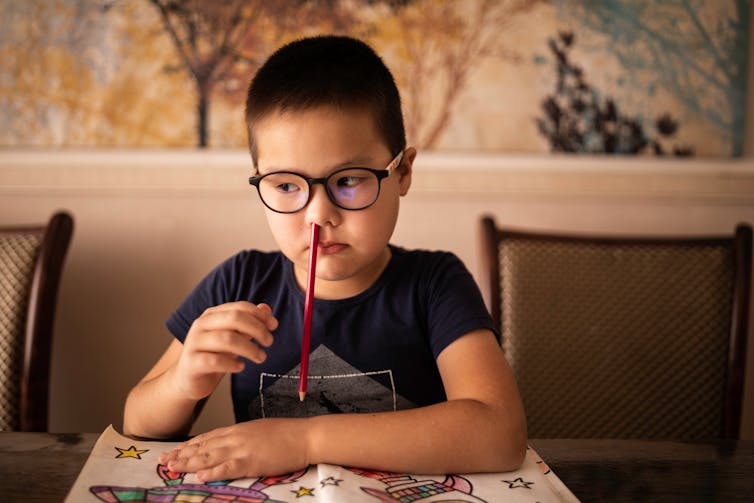
By Amy Brown
Parents today spend more time with their children than ever before. Yet, at the same time, they worry more than previous generations about doing enough – believing a lack of engagement may harm their child’s future success and wellbeing.
This can have negative impacts. Increased social pressures on mothers to be engaged with their children, compared to fathers, is negatively affecting maternal wellbeing. The Covid-19 pandemic and home schooling intensified this.
This raises an important question: how much attention is enough? Is it harmful to leave your child to their own devices? Should you ever ignore a child? Or conversely, can you overly engage with your child? As is usually the case with child development, the answer is somewhere in the middle (and most parents, reassuringly, are doing “enough”).
We know that a supportive parenting approach is important for child development. Attachment theory states that when a baby has its needs met by a parent or primary caregiver in an appropriate and consistent way, they are more likely to go on to develop a secure attachment to that person.
This helps them to feel more confident in themselves and the world, leading to more positive cognitive, social and emotional development. However, while secure attachment is important, ever rising levels of attention won’t necessarily increase it proportionally. Instead, it is important to carefully consider the degree of engagement and balance this with supporting children to reach appropriate stages of resilience and independence.
One piece of evidence which gets dragged up a lot when attachment is discussed is research on the outcomes of children placed in Romanian orphanages. These children were typically significantly deprived of interaction, affection and care and did not have opportunity to develop a secure attachment. Studies of their later development found that they had poorer physical, cognitive and social developmental outcomes.
These studies are important, but a world away from the spectrum of parental engagement that most parents worry about today.
Research examining more typical parent-child relationships finds that, yes, when mothers and fathers are more connected to and involved with their children, social and emotional outcomes improve.
Talking and reading to children in their early years is particularly important for language and literacy skills. Listening to, and supporting, children to understand and learn to regulate their own emotions is also important for later emotional and social wellbeing.
Curiosity, confidence and narcissism
On the other hand, children also need room to take the lead in their own growth and development.
Overly intensive or “helicopter” parenting, where parents are reluctant to leave their child to experience activities alone (obviously sometimes this is impossible, for example if the child has additional learning needs), can actually increase risk of anxiety and poorer coping skills in the children when they become teenagers and young adults.
That’s because children learn through having the opportunity to make mistakes, taking small, age-appropriate risks during play and having the chance to decide which activity they will engage in.
This builds feelings of competence, agency and autonomy. Boredom, in moderation, also encourages active and creative play which has many positive outcomes for physical, cognitive and social development, and has also been linked to increased curiosity.

Aiman Dairabaeva/Shuttestock
Conversely, when a child’s day is controlled for them and their path always smoothed, they can struggle to develop the coping skills and resilience needed for everyday life.
And while it may seem attention will ultimately boost confidence, there is some evidence showing that when parents are overly focused on their children – living their lives through them, constantly validating them and putting intense pressure on them to perform – this can increase narcissistic traits in children when they reach young adulthood.
Changing and adapting
How much engagement a child needs also naturally changes over time. Babies and children develop physically and emotionally as they grow, and parenting that adapts to these changes is typically associated with better outcomes.
It doesn’t make sense to leave a young baby who has no ability to support themselves alone for long periods to “encourage their independence”. That will instead likely increase stress hormone levels in their young, developing brains. But telling your pre-teen that they need to entertain themselves for the afternoon (at home) is supporting their growth.
This brings us the concept of a happy medium and one of my favourite 20th century paediatricians – Donald Winnicott and his concept of “good enough mothering”. Winnicott spent many years watching mothers and babies and concluded that sometimes not being able to meet a baby’s needs immediately and perfectly was a good thing.
Although he believed that responding to a baby’s needs was important, he also believed that sometimes, having to wait a little because you are finishing something else, helped a baby learn that although they are loved and cared for, the world is not a perfect place.
This theory has been explored over the years and written about extensively in terms of broader “good enough parenting”, which is essentially supporting a happy medium.
Finally, one fascinating study looked at how much parents felt pressure to spend more time engaging with their children, and how much time they actually spent reading, doing sports, or watching television with them.
Surprisingly, there was no significant relationship between the parents who felt the most and least pressure, suggesting that no matter how much time you spend engaging with your child, those feelings never really go away.
Perhaps that is the most important lesson. The vast majority of parents do enough (and if you’re worrying about it, it’s likely you do). Instead those feelings are driven by social judgement of all things parenting related. Let’s challenge that, instead of spending all that energy on worrying whether our children get enough attention.
![]()
Amy Brown is Professor of Child Public Health at Swansea University.





























Ray W. says
When my four children were very young (five-year span from oldest to youngest), one of my favorite activities with them was to take them on occasion to the beach in the Shores at low tide on weekends. I would kneel and begin digging a hole in the sand by hand near the waterline, throwing the sand into the shape of a large fort approximately eight feet across. As the hole deepened, it filled with water and sand would fall into the water, ever widening the deepening hole.
Whenever I unearthed a seashell, I would give it to one of my children and ask him or her to present it as a gift to any older couple that randomly happened to be walking by, instructing that child to run up to the couple, offer them the seashell and say, “Would you like a nice seashell?” The elderly couple would always praise that child and accept the seashell.
As the walls of the fort became higher, my children would begin jumping over the wall into and out of the fort, sometimes playing in the soon sizable pool of water, sometimes playing in the surf. Within a few minutes, another child would show up and begin playing with my children. Soon enough, others would appear. In time, there might be 20 children running and playing in the surf and inside the walls of the fort, with their parents standing far outside the circle. I would look up and down the beach. Every child of similar age for blocks around would gravitate to the fort. It would become a free for all, with young children chasing and running and jumping for the simple joy of running and jumping and chasing.
None of the parents ever really said anything or corrected anyone; they just watched and let the kids play in the impromptu and unorganized activities. Structured play was not my goal. I was just the anchor, creating a safe space for exuberant and joyful interactions. I wanted my children to be comfortable around other new children, and to develop coping mechanisms for meeting strangers. Almost every child, I still believe, when given the chance and at that age in life, will happily and freely play with other children just for the sheer fun of it, without fear of strangers. There is something exhilarating about running as fast as you can when you are six years old.
When the tide began approaching the wall, I would ask all of the children to work together in helping me build the wall higher to hold back the tide. King Canute had nothing on me. Kids would be shoveling sand together, frantically trying to reinforce the wall facing the incoming tide, with much laughter and chatter, but the tide always won.
By then tired out from shoveling sand with my hands for one or two hours, I would take my children home.
Why? I knew from a very old psychology article that when children play in an unfenced playground, they tend to group in the center. When a fence is erected around the playground, they spread out in the entire play area. I just created a fence, however small, and it soon filled with kids.
Laurel says
I’m not 100% sure I agree with good enough. Manners are sorely missing (unless you are in South Carolina). I was in Walmart once, in the cafeteria, and there was an older, black grandmother with four little ones (I’m focusing on black and older woman here for a reason) the oldest couldn’t be more than seven. She had those kids dressed perfectly. Those kids sat up straight, talked at a moderate level and stayed in their seats. They were happy. They were so well behaved that I had to stare! On my way out, I congratulated her on her well behaved children, told her how impressed I was with her kids and she graciously thanked me. I don’t see that too much anymore with any color and any age caretaker. In fact, most white kids are out of control. I’m sick of seeing kids scream in restaurants, climb out of their chairs, crawl on the floor and run around.
We recently went to visit some people with a small child. They doted on that kid to the point of annoyance! That kid is certain that the universe revolves around her, and is in for a major shock someday when someone treats her differently, like the first break up.
My husband and I have talked about this and we joke about how we ran out the door and was not expected back until sunset. We were to get home before the street lights came on. We had no wrist braces, knee braces, helmets, etc., and got plenty of cuts and bruises to learn not to do whatever action again that gave us those wounds. We NEVER screamed or got loud in restaurants, and we stayed in our chairs. To this day, “please” and “thank you” are solid in our vocabularies. Our parents did not live vicariously through us. But obviously, we weren’t ignored either.